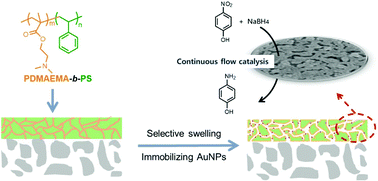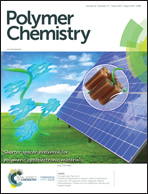Nanoporous block copolymer membranes immobilized with gold nanoparticles for continuous flow catalysis†
Abstract
Nanoporous polymers with functionalizable surfaces are desired in the preparation of reactors for continuous flow catalysis. Here a facile approach for the fabrication of flow reactors is developed by immobilizing Au nanoparticles (AuNPs) on nanoporous membranes derived from block copolymers (BCPs). We synthesized the BCP of poly(2-dimethylaminoethyl methacrylate) and polystyrene (PDMAEMA-b-PS) where the PDMAEMA minority blocks contain tertiary amine groups so as to anchor the Au precursors. Simply soaking the BCP in hot ethanol generated interconnected nanopores with PDMAEMA chains enriched on pore walls following the mechanism of selective swelling induced pore generation. The nanoporous BCP membranes were used as supports to immobilize the AuNPs via in situ reduction of the Au precursors, producing catalytic reactors with the amount of AuNPs conveniently tunable by changing the concentration of the Au precursors. The nanoporous BCPs provided tortuous channels to host more AuNPs and to increase the chances of contact between the reactants and the AuNPs in flow reactions. Thus-produced AuNP-anchored BCP membranes were used as flow reactors to catalytically transform nitrophenol to aminophenol, and a catalytic efficiency up to 100% was reached. We also demonstrated that the membranes were highly efficient in the catalytic degradation of organic dyes.



 Please wait while we load your content...
Please wait while we load your content...